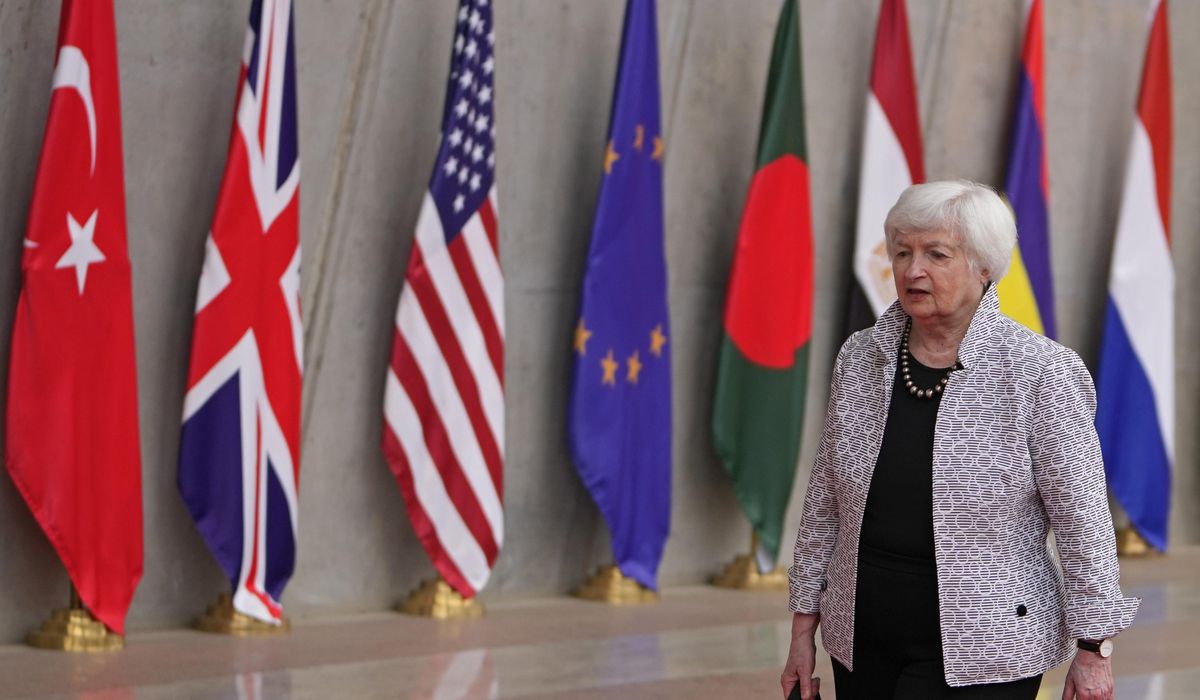The imposition of war sanctions on Russia reveals increasing divisions within the Group of 20 nations.

Some prominent wealthy and developing nations are increasingly doubtful of Treasury Secretary Janet Yellen due to the ongoing repercussions of sanctions against Russia, which are causing further divisions within the Group of 20 countries.
With world leaders and finance ministers meeting this week in India for the G20 summit, fractures have came into the open, and alliances are tightening among some nations that have long been resistant to the U.S.-led efforts to exact economic punishment on Moscow for its war in Ukraine.
The United States and its allies among the Group of Seven major industrial nations insist that the sanctions and a price cap on Russian oil have been successful at restricting revenue for the Russian economy, even though it grew, in a year-to-year comparison, by 4.9% in the second quarter of 2023.
Russia and China, meanwhile, have declared a “no limits” partnership of their own. And the economic bloc of Brazil, Russia, India, China and South Africa – known as BRICS – is trying to increase its use of local currencies instead of the U.S. dollar. Also likely to be seen at the G20 summit is budding closeness of U.S.-India ties in light of a shared concern about China’s military and economic assertiveness.
During their visit to New Delhi, President Joe Biden and Yellen will face the challenge of maneuvering through a complex economic and political landscape while engaging in challenging discussions regarding the procurement of food and energy resources for developing nations.
Yellen is visiting India for the fourth time in less than a year. This visit comes after Russian President Vladimir Putin stated that a significant agreement, which permitted Ukraine to export grain through the Black Sea during the war, will not be reinstated until the West fulfills his requirements regarding Moscow’s agricultural exports.
Putin claims that a separate agreement, which guarantees the elimination of barriers to Russian food and fertilizer exports, has not been respected. Russian authorities also express dissatisfaction with limitations on shipping and insurance, which have hindered their agricultural trade. However, it is worth noting that Russia has managed to ship unprecedented quantities of wheat since the previous year.
Russia is hoping it can use its power over Ukraine’s Black Sea exports as a bargaining chip to reduce Western sanctions.
“I believe that a variety of factors contribute to the challenges faced by the G20 in working together as effectively as they have in the past,” stated Rachel Ziemba, an adjunct senior fellow at the Center for a New American Security. These factors encompass the conflict in Ukraine and the manipulation of currencies and commodities by nations, she explained.
She mentioned that something they might support is the significance of ensuring access to energy and food, as well as addressing food security concerns in developing countries.
The Treasury Department said Yellen’s four-day trip will highlight “the importance of imposing severe costs on Russia and mitigating global spillovers.” Yellen will stress the consequences of the war, “including through the price cap, which has been achieving its dual goals of reducing Russian revenue while keeping global energy prices stable,” the department said.
Yellen’s main objective will be to enhance food security by implementing modifications to multilateral development banks and replenishing the International Fund for Agricultural Development. This task may prove challenging due to the growing tendency of G20 nations to form alliances and the absence of certain leaders, such as Chinese President Xi Jinping, who have chosen not to attend the summit.
Josh Lipsky, senior director of the Atlantic Council’s GeoEconomics Center, said the meetings should be an opportunity to work at what the nations agree upon, including multilateral development bank issues and changes to debt restructuring.
“I cannot reword.”
According to a report from the International Monetary Fund in August, there are potential dangers associated with increased fractures in the global economy. The report suggests that imposing more trade restrictions could lead to a significant decline in global economic output, estimated to be around 7% in the long run, equivalent to approximately $7.4 trillion.
The trade between China and Russia has significantly increased, primarily because of the Western sanctions on Russia and the price limit on Russian oil. This limit enables China and India to buy energy from Russia at lower prices. However, China’s economy is currently experiencing a general decline.
Mark Sobel, a senior adviser at the Center for Strategic and International Studies, said that despite Russian oil shipments being reoriented to China and India, the G7 anticipated “if it gave China and India greater scope to seek discounts on Russian oil, that meant less revenue for Russia and was consistent with the thrust of G7 actions.”
Sobel said the sanctions against Russia as well as other measures to curb Russian oil proceeds were “targeted and highly appropriate.”
Russia and China are increasingly trading in China’s yuan, which replaced the U.S. dollar as Russia’s most traded currency in early 2023.
The BRICS countries have reached a consensus to enhance the use of their own currencies in trade, aiming to decrease dependence on the U.S. dollar. Concerns are growing among critics in developing nations regarding the U.S.’s capacity to utilize the global impact of the dollar to enforce sanctions on its adversaries, such as Russia.
In 2015, the BRICS nations introduced the New Development Bank as a substitute for the International Monetary Fund and World Bank, which were primarily influenced by the United States and Europe.
“I cannot reword”
The G20 consists of the European Union and the following countries: Argentina, Australia, Brazil, Britain, Canada, China, France, Germany, India, Indonesia, Italy, Japan, Mexico, Russia, Saudi Arabia, South Africa, South Korea, Turkey, and the United States.

